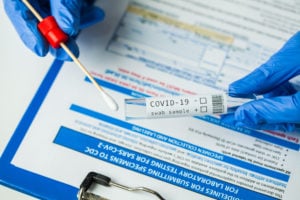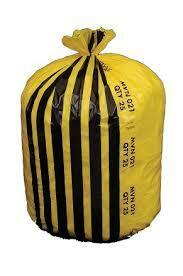Lateral flow tests (LFT) are used to detect Covid-19 in a quick way, usually providing a result within 30 minutes. They are part of mass testing for the Coronavirus. A number of community testing centres were set up in some of Westminster’s churches and leisure centres. These test centres will stay operational until 31 March 2021, however this could change.
LFT waste generated in non-health care settings such as at schools, households, offices, shops etc. can be disposed of as general waste. Please ensure you do not throw the test kits away as recycling.

Most LFT are used within community testing centres
However, if the tests are used in a health care setting, for example hospitals, clinics, other dedicated health care facilities or at mass population testing sites set up as part of Test & Trace, the rules on waste disposal are different. Please see here for further information.
The test kit waste from testing sites such as these requires specialist management and Westminster City Council Commercial Waste Services can help.
How should I handle lateral flow testing waste?
When you set up a rapid testing site at a health care premises, please speak to us about how the LFT waste will be managed straight away. You need to make specific plans for the handling, storage and collection of this waste. We will be happy to help you with this.
Waste produced from rapid testing sites includes:
- (takeaway) food packaging – (generated by staff on-site)
- packaging – (cardboard boxes, plastic bags, information leaflets)
- single-use PPE – (face masks, face shields, gloves and plastic aprons)
- testing kits (testing swabs and packaging/cassettes, pipette and small (6ml) testing bottles with solution, testing strip and packaging including silicon sacks
Please note that waste from rapid testing sites is NOT clinical waste
Whilst spent tests and swabs have properties that require incineration, they do not need to be consigned as hazardous infectious clinical waste.
The waste from test kits and PPE must be segregated however into two categories and stored separately before collection.

Example of a ‘tiger bag’ for PPE waste
- The test kits should be placed in a transparent bag and placed in the dedicated waste container ready for collection.
- Any PPE worn by staff administering the tests is classed as ‘offensive waste’. and should be placed in yellow bags with a black stripe, so-called ‘tiger bags’. These bags should then be placed in the dedicated container ready for collection.
Packaging from e.g. take-away food and cardboard boxes containing test kits can be thrown away as general waste or recycled as normal.
Collection of LFT waste
We have a safe and reliable lateral flow testing waste collection service already in operation that is servicing the City Council testing sites and are able to offer a similar service to other sites as well.
We can supply you with the external containers into which LFT waste is gathered before collection. If you do not already have the dedicated bags we can provide these for you. We are happy to set up scheduled collections and ensure your LFT waste is taken for secure and safe treatment, giving you peace of mind that you are compliant with all waste legislation
We have made a special arrangement with SELCHP, our energy from waste facility, for the destruction of clinical waste. This ensures the total, hygienic and environmentally safe destruction of LFT waste.
We have further information around Covid-19 and waste on the following pages:





